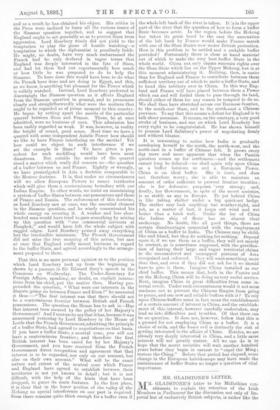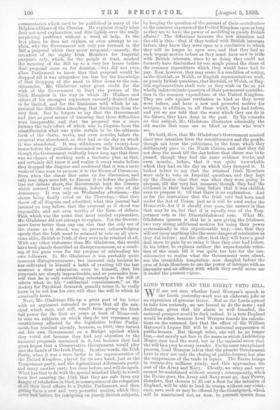MR. GLADSTONE'S LETTER.
NUR. GLADSTONE'S letter to his Midlothian con- stituents to explain the retention of the Irish Members in Parliament for the discussion not only of Im- perial but of exclusively British subjects, is rather like the commentaries which used to be published in many of the Delphin editions of the Classics. He explains clearly what does not need explanation, and flits lightly over the really perplexing problems without a word of help. In the first place, he does not explain, or even attempt to ex- plain, why the Government not only put forward in the Bill a proposal which they never proposed,—namely, the retention of the eighty Irish Members for Imperial purposes only, which, for the people at least, masked the meaning of the Bill up to a very few hours before that proposal came on for decision,—but did not even allow Parliament to know that that proposal would be dropped till it was altogether too late for the knowledge of that dropping of the mask to filter down to the con- stituencies. Mr. Gladstone takes great credit for the wish of the Government to limit the powers of the Irish Members in the way in which Mr. Wallace and others of his strongest supporters earnestly desired them lo be limited, and for the frankness with which he an- nounced the difficulties attending that limitation from the very first. But he forgets to say that the Government had just as good means of knowing that these difficulties were insuperable, and that the proposal was a mere dummy the only effect of which was to disguise from the constituencies what was quite certain to be the ultimate form of the clause, weeks, and even months, before the proposal was abandoned, as they had on the day on which it was abandoned. It was withdrawn only twenty-four hours before the guillotine descended on the Ninth Clause, though the Government evidently knew long ago that there was no chance of working such a fantastic plan as that, and certainly did know it and realise it many weeks before they dropped the disguise and confessed that it was a mere waste of time even to propose it to the House of Commons. Even when the clause first came on for discussion, and only four days were left to discuss it in before the guillo- tine cut debate short% the Government kept the dummy which covered their real design, before the eyes of the democracy. It was only on Wednesday afternoon,—the clause being finally voted on the Thursday,—that they threw off all disguise and admitted, what this journal had insisted on long before, that the proposal as it stood was impossible, and not even worthy of the form of debate. This, which was the point that most needed explanation, Mr. Gladstone did not attempt to explain. Yet the Govern- ment knew better than any one else that the only use of the clause as it stood, was to prevent acknowledging openly that the Irish must be retained to vote on all ques- tions alike, British or Irish, if they were to be retained at all. With any other statesman than Mr. Gladstone, this would have been plainly described as disingenuousness, as a mask- ing of his guns even for the purpose of misleading his own followers, In Mr. Gladstone it was probably quite innocent disingenuousness ; but innocent only because he has cultivated in himself a habit of evading till the last moment a, clear admission, even to himself, that his proposals are simply impracticable, and so persuades him- self that he is only submitting reluctantly to the will of others what, in his " subliminal consciousness," as the Society for Psychical Research grandly terms it, he really knew to be not less his own will than the will to which he nominally bows. Next, Mr. Gladstone fills up a great part of his letter with an argument intended to prove that all the mis- chief which may, and will, result from giving the Irish full power for the first six years at least of Home-rule to vote on subjects on which they do not represent any constituency affected by the legislation before Parlia- ment, has resulted already, because, in 1885, they turned out his own Government on a Budget against which they voted not because they had any objection to the financial proposals contained in it, but because they had great hopes that a Conservative Government would play into the hands of the Irish Party. In other words, the Irish Party, when it was a mere factor in the representation of the United Kingdom, played for its own hand, just as the Temperance party, and the Agricultural Allotments party, and many another party has done before, and will do again. What has that to do with the special mischief likely to result from first assuring the Irish that they are safe from any danger of retaliation in kind, in consequence of the relegation of all their local affairs to a Dublin Parliament, and then giving them a new and very powerful motive, which they never had before, for intriguing on purely British subjects, by keeping the question of the amount of their contribution to the common expenses of the United Kingdom open as long as they are to have the power of meddling in purely British affairs P The difference between the new situation and the old is this,—that if they trifled with British interests before, they knew they were open to a retaliation to which they will no longer be open now, and that they had no such urgent motive before as they must have now to trifle with British interests, since by so doing they could not formerly have diminished by one single pound the share of the common expenditure which they would have had to pay. Now, however, they may make it a condition of voting, as the Scottish, or Welsh, or English representatives wish, on purely British questions, that Scottish, or Welsh, or Eng- lish representatives shall vote as they wish on the as yet wholly indeterminate question of their permanent contribu- tion to the common expenditure of the United Kingdom. They are safe against retaliation in kind as they never were before, and have a new and powerful motive for intrigue, in addition to all those which they had before, and yet we are told that the worst which they can do in the future, they have done in the past. By his remarks on this subject, Mr. Gladstone illustrates admirably the old maxim that- none are so blind as those who won't see.
We hold, then, that Mr. Gladstone's Government masked their true intention from the constituencies and the people, though not from the politicians, by the form which they deliberately gave to the Ninth Clause, and that they did not drop the mask till the day before that clause was to be passed, though they had the same evidence weeks, and even months, before, that it was quite unworkable which they had on the day on which they dropped it. It looked better to say that the retained Irish Members were only to vote on Imperial questions, and they kept up the illusion that that was what they were going to propose, till the very last moment, though they had the evidence in their hands long before that it was childish even to propose it. Of that there is no explanation. And as for the contention that the Irish vote had been used under the Act of Union, just as it will be used under the Home-rule Act if it should ever pass, the answer is that that may be so, but that it is equally true of the Tem- perance vote or the Disestablishment vote. What Mr. Gladstone ignores is that he is now giving the Irishmen two very strong additional motives for using their power systematically in this objectionable way,—one, that they will not incur anything like the same danger of retaliation as they did before ; and the other, that they will have a good deal more to gain by so using it than they ever had before. In his letter, he explains neither the unpardonable reten- tion of the mask till it was quite too late for the con- stituencies to realise what the Government were about, nor the irresistible temptation now dangled before the eves of Irish Members to use the power of intrigue with an impunity and an efficacy with which they could never use it under the present regime.



































 Previous page
Previous page